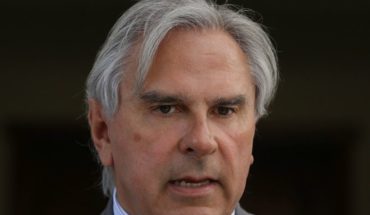
In the highest spheres of power, the economy comes first… until Covid-19 arrived.
This disease caused by a new coronavirus that emerged in China has already infected more than half a million globally and by this Saturday it has claimed more than 28,000 lives, says the count of The John Hopkins University of the United States.
The fear of bringing health systems around the world, from the most precarious to the most advanced, has led to something unprecedented: that for the first time, governments should defend public health, not only above the economy, but at its expense.
Alicia Bárcena, executive secretary of the United Nations Economic Commission for Latin America and the Caribbean (Cepal), warns that a global recession is looming that will cause the region’s GDP to decline, unemployment to rise and millions of people to join poverty rates.
A crisis so deep that it will force us to rethink globalization and our economic system.
Alicia Bárcena says that you have to think very carefully about the model of development that is going to come out of this crisis: “If it’s going to be capitalism, very well, but a different capitalism, a much more inclusive, much more sustainable capitalism.”
In the face of the closure of borders and the reduction of transport, it will be important to aim towards integration and regional self-sufficiency, says Bárcena in this interview granted by telephone from Chile.
It has also called for an uprising, albeit temporary, of sanctions on Cuba and Venezuela so that they can weather the difficulties of the fight against Covid-19.
Compared to economic crises like 2008 or other that Latin America may have experienced, is it greater?
Definitely much larger because we are looming a deep recession that is sure to cost a double-digit in the next two quarters of the economy. And, for Latin America, this is very serious.
We have made preliminary projections and we have seen that simply by calculating the impact on China and Europe, which are two of the main trading partners in the region, [el PIB de] Latin America will fall by 1.8%.
And in terms of internal consequences of local economies, this can reach -3% without a doubt.
In addition, we are faced with fragmented health systems, where logically there are a number of problems because there are large gaps in access to them. Of those employed age 15 and over, 57.3% of the population has health coverage.
And at the lowest levels, the poorest, only 34% have health coverage.
So, yes, we’re facing one of the strongest crises in health systems.
We have calculated that if the economy were to fall by 1.8%, this would have an impact of an unemployment rise of 10 percentage points.
This would have a strong impact on the poorest families and inequality. In fact, we also estimate that with this fall in GDP and this increase in unemployment, the number of people living in poverty would increase from 185.9 million to 219.1 million.
And in extreme poverty, they would rise from 67.5 million to 90.7 million. That is, yes, we are talking about a very strong impact on households, people, small and medium-sized enterprises and self-employed people.
By this year, Cepal had estimated that Latin America would grow by 1.3%. Now, with the hit of the coronavirus in China, he tells me that he calculates a drop of 1.8%, but that this can be double digits…
Over the next two quarters globally. In Latin America, the average for the region would be -1.8%, simply considering the impact of China and Europe. We even believe that this may fall even further, by 3%, for example.
China economy’s heavy hit hits Latin America’s rebound
Because the United States has not yet been taken into account…
That’s right, the U.S. and the region’s own economies are missing. What is going to happen within the domestic economy, consumption, for example.
If the household income is going to fall because there’s going to be job loss, it’s going to have a very strong impact [en el consumo].
From a health point of view, this is seen as an absolutely necessary movement to save millions of lives. But if we see it only from a strictly economic perspective, it looks like suicide, doesn’t it? We are, in a way, disarm the current economic system, are we going to be able to reassemble it as it was?
I don’t think so, definitely. The value chains have been broken.
One of the transmission channels for our region is the decline in China’s economic activity, which was an important destination for our exports, but also one of the most important manufacturing countries in the world.
Besides, almost everyone was importing parts and intermediate goods from China. I mean, there’s been a break or breakout of global value chains and reassuming these strings is going to be very difficult…
There is an expectation that this crisis will be temporary, that it will last about six months. I hope so. But the truth is that there are aspects of the economy that are indeed going to be very difficult to recover.
So we have to rethink the economy from many perspectives.
We, for example, are seeing that it will be very important for the economies of Latin America and the Caribbean to resume regional integration, that is, to try to return to a kind of regional self-sufficiency.
This is going to look a lot like a war economy… Transport has been cut off, barriers have become enormous.
So what we should see is how to reconstitute a different economy, more integrated towards the local, also seeking guidelines of self-sufficiency, for example, food, which is another of the issues that has not come out, but surely a very important one will come food shortages, especially in vulnerable economies that rely on imports.
Rightly speaking of integration, right now we are at a time when we are closing our borders and some states even prohibit internal displacement. Is it going to end up in coronavirus with globalization?
I think that’s one of the risks: that globalization, at least as we knew it before this pandemic, is definitely going to be different.
I think not for the sake of connectivity, you’re sure you’re in Europe and I’m in Chile, but that connectivity allows us to communicate.
However, this is definitely no longer going to be a value chain globalization. That’s what’s going to be most important: the change in production modes and modes of consumption.
Cepal estimates that the crisis unleashed by the new coronavirus will increase the number of poor people in Latin America by millions.
And as Cepal’s executive secretary, what do you find most troubling about the current crisis?
Well, several things. On the one hand, I am concerned that our health systems have the ability to respond…
And second, protect families’ incomes. We are concerned that there are a lot of people who can be left unemployed and out of income. I really think that’s the central issue.
We have calculated that there are 32.7% of self-employed people in the region, who are unskilled and are fundamentally in the informality.
At Cepal we are monitoring what countries are doing and trying to see what the best options may be…
I must also say, frankly, that, for example, sanctions should be lifted to Venezuela and Cuba, at least temporarily.
We cannot isolate these two countries from the arrival of pharmacists, fuel, food… They are countries that import almost 100% of their food and I believe that these are concrete measures that we should monitor and take.
At a lecture he gave last week, he said that if venezuela did not lift sanctions, he would practically be “killing those people.” Is the situation that serious?
I think it’s very serious. Cuba, despite sanctions, is even offering help, sending doctors to Italy and elsewhere.
But in the case of Venezuela, hospitals have no water, no electricity, no medicine, equipment, soap.
So much so that you’re asked to wash your hands, but if there’s no soap, how do you do it?
So I believe that this call is fundamental and also a call to the International Monetary Fund (IMF) and the World Bank to consider sincerely postponing the payment of external debts and even, in the case of countries with lower resources, forgiveness of bilateral and multilateral debts.
Bárcena called for the lifting of sanctions against Cuba and Venezuela, at least temporarily.
It was just recently that the International Monetary Fund denied Venezuela aid.
Exactly. So imagine if Venezuela is coming to the IMF and this aid is being denied and sanctions continue, because we are actually condemning or condemning a people.
Because, regardless of what can then be said politically, it will obviously have to be discussed later; there is an emergency right now and it is very important to raise it.
Financial support to developing countries, to all, and the preparation of a common exit strategy to the crisis are key.
Latin America has not yet managed to assimilate and respond effectively to this great migration crisis that we have: the diaspora of more than four million Venezuelans, many of them, spread throughout our region and in vulnerable conditions. How will the coronavirus crisis affect you, is something That’s worried about Cepal? Should they govern themus take economic measures specially designed for them?
Well, no doubt, I think the first thing is to avoid xenophobia in the sense that there are many migrants who are in neighbouring countries.
We must support them and give them the same health and income care conditions that will be given to the rest of the population. It is a problem because many migrants are illegal and even in some countries we do not know where they are.
Sometimes they also live in very precarious, crowded conditions, and that is why we think that, for example, organizations such as UNHCR [Alto Comisionado de las Naciones Unidas para los Refugiados], such as IOM [Organización Internacional para las Migraciones], they must have all the support to be able to help these people, who are finally a rather vulnerable population that is far from home.
Within the region, which countries are leading the response to coronavirus and which are falling behind?
I would say that one of the countries that is leading this action is Argentina, which has taken the most action in terms of border restriction, preventive quarantines, support for workers.
Despite its enormous problem with its external debt, Argentina has taken very strong and very deep actions.
The other, has been Peru, which has also taken very strong action, including these income support for poor households.
Chile I think it is also a country that is taking very important actions. Paraguay, El Salvador, are countries that have taken very hard steps to contain the spread of the virus. I believe that these countries are the ones working harder.
Peru was one of the first countries in the region to dictate self-confinement.
In the case of Mexico, I think they are already entering a process of reduced activity. Mexico has a fairly important public health system, so I think the Mexican health authorities are well aware that they have to start all their infrastructure in order to support the population.
It is one of the countries with the largest population, as is Brazil. I think Brazil and Mexico may have taken a little longer to take stronger action, along with Nicaragua, but we think that, well, somehow they’re already joining.
It was precisely Mexico and Brazil that have been heavily criticized for this slow response to the virus. Some would even call it a denialist.
I think that’s already happened, the denieration has happened and above all, what I do think is that they are following the guidance of the World Health Organization (WHO).
WHO has not said that there should be a total quarantine. WHO has clearly said that this is a pandemic moving from the northern hemisphere to the southern hemisphere.
Of course, all the forecasts of the case must be taken, but what is happening is that some countries are taking it more gradually, which does not mean that they are not taking it seriously.
I think everyone is very aware of the importance of acting and above all of isolating, of staying at home. In short, these are the recommendations that WHO is making.
There are some countries that are investing in aid for the poorest households, so that they can survive the days of self-isolation. But if these days become weeks or months, how sustainable in time will those social aids be?
I think countries should plan for at least the next six months.
WHO was talking about 12 weeks, but maybe it’s 24, right? And besides, in the southern hemisphere we are entering into the winter…
No one has the magic ball to know what can be done, I’m talking about what we’ve managed to evaluate. But beyond that, it’s very difficult to know what can happen in the next six months.
What I can tell you is that there will be a great global recession over the next six months, that governments have to prepare and prop up the poorest households, the incomeless, the informality… For that you have to prepare, at least, for the next six months.
Cepal’s executive secretary praised how Argentina has faced the crisis.
Can poverty figures be avoided in any way?
In poverty alleviation there are two things: employment and conditional transfers, tax transfers.
In this case, what concerns is that those tax transfers are going to have to be bigger and they’re going to have to reach more people. Therefore, countries have to schedule that, in addition to lowering health costs.
For example, price control is starting to take place here in Chile. A price check, for example, so that the exam costs much less or is even free.
There must be universal access to coronavirus examination, medical treatment and certainly income in all households, at least minimal.
That’s what countries have to do with it: how they get a minimum citizen income to households for the next six months. That’s our recommendation.
Any final reflections?
In this frantic life of globalization, we have made the planet sick: today we have a planet sick with polluted oceans and rivers, devastated forests, biodiversity and a massive expanse of extinction of some species.
So we also have to ponder whether what we were doing in terms of economics, system, economic model is what we need to continue.
I believe that we must rethink and thoroughly what kind of model of development should emerge from this crisis.
We never expected a problem of this nature to arise and yet there we are and we have to make efforts to recap and think.
If it’s going to be capitalism, fine, but a different capitalism, a much more inclusive capitalism, much more sustainable and re-based on local economies.





